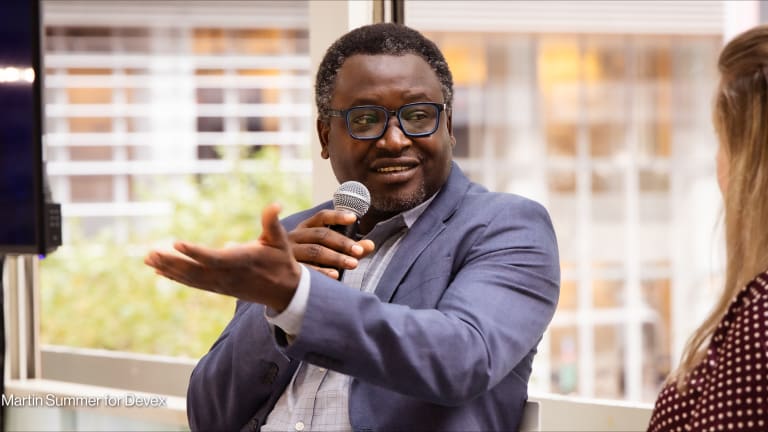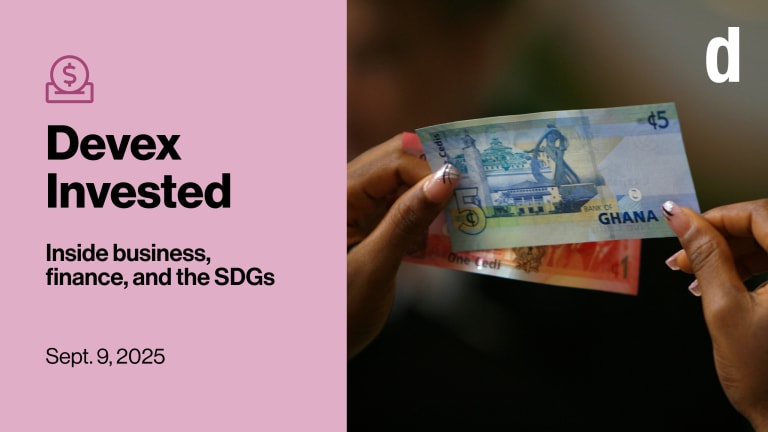Q&A: How the African Development Bank is improving data quality
Walter Odero, macroeconomist of the African Development Bank, talks with Devex about improving the quality of data in order to improve the effectiveness of programming.
NAIROBI — Quality data is key to ensuring that aid programs are effective. The African Development Bank is working to strengthen the capacity of data-gathering institutions, said Walter Odero, macroeconomist for the AfDB in Kenya. Odero works in consultation with the Kenyan government on areas including debt and interest rate management, as well as in undertaking studies, including an examination of why investments in areas such as infrastructure have not brought significant economic growth to Kenya. He is one of the authors of the annual African Economic Outlook. In a conversation with Devex, Odero stressed the need for better coordination in data gathering and dissemination among institutions. Our conversation has been edited for length and clarity. How does the African Development Bank ensure it’s using the best data, in the right ways? We build the capacity of the institutions that build the primary data. For example, we work with national bureaus of statistics to build their capacity. Together with the IMF and the World Bank, we have been building the capacity of almost all the bureaus of statistics across the continent. We make sure they have well-trained personnel, well-equipped IT staff, and that they are able to develop models and transmit data on time. Once we identify the situation in the country, we look at the challenges, and then we look at opportunities, and then we look at how do we change the culture of the country. --— In Kenya, over the last three years, we realized that agriculture statistics have been collected, but not with the quality we would expect. We have encouraged the Kenyan government to build a strategy for agricultural statistical gathering. That strategy, over the next five years, will help them to build their systems. The government collects all sorts of data on agriculture. But compared to countries like Nigeria, where they have mapped out a database on farmers, Kenya doesn’t have that. We know there are farmers producing products like coffee and tea. We know the quantity of tea that is produced, but we don’t know who is producing it. Because of this, we don’t know how to respond to the needs of these farmers. It will make a difference in Kenya in several ways, by helping the institutions respond to the needs of the farmers. For example, banks say in a blanket manner that farmers are risky customers. When you have information on who the farmers are, then you can identify the less risky ones and the banks can respond to them appropriately. We are moving into crop and livestock insurance. Without that type of data, how do you know who you can insure? Insurers normally segment their market, so they know which groups of farmers are less risky and which farmers are riskier. They can then insure those that are less risky, and the government can insure those that are riskier. The data helps in decision-making for banks, government institutions, and insurance companies. You’ve talked about the importance of instilling a “results culture” in institutions. Why is that important? Within the African Development Bank, we are driving an agenda called Managing for Development Results. In this agenda, people sleep, work, and wake up knowing there are results to be achieved. Everything they do is geared toward achieving something. You don’t just work and go home, happy that you earned a salary. It’s about achieving outcomes and delivering outputs. In 2007, we created this specialized project for the managing of development results, and we’ve created what we call African Community of Practice. It brings together public institutions, civil society, private institutions, and individuals to try to encourage countries, governments, and institutions to achieve results. It talks about a couple of things. Do we have leadership that will drive the results, at the policy and institutional level? If we have that, then the next pillar is: have we planned for it? Have we budgeted for it? If we budgeted for it, have we created an accountability mechanism, and have we built up the capacity? We have to do an assessment of all of those pillars. What is the situation in the country? Once we identify the situation in the country, we look at the challenges, and then we look at opportunities, and then we look at how do we change the culture of the country. Over the past 10 years, we’ve been working on this with countries like Kenya, Zimbabwe, Sierra Leone, Mozambique, South Africa, and Côte D’Ivoire. Now, we are working to build the ones that are still left behind so they can learn from the others. How can data be used in the wrong ways? Economists say that data can be used to teach and to cheat. --— Economists say that data can be used to teach and to cheat. Let me look at the cheating side of it. Politicians can use data to paint pictures of certain communities. This could be to say that a group of people are lazy, and that you can only do so much for them. It could be used to say that a group of people are hard-working. When you profile communities in that way, you are heading in a dangerous direction. It’s dangerous because development objectives will be guided by subjective decisions. This is simply because you have collected the wrong data, or you have collected data that is not wrong, but you’ve used it in the wrong way. The best way to prevent this is to ensure that data is collected by the right people and used in the right way. For example, biometric data. Biometric data should not be a tool for anyone to collect. This is the kind of data that defines an individual. This data should only be collected by the right institutions. When it comes to socio-economic data, for example, not every Tom, Dick, and Harry should collect data on the situations surrounding HIV and AIDS, or reproduction, and disseminate it carelessly. Specialized institutions need to be responsible for specialized data, and then it is disseminated to the right targets. We need to have a common understanding for all sorts of data, and then we segment who should collect this data. Then we need to pump those agencies with adequate resources to collect that data for consumption by everybody. This is instead of spreading out all of our efforts, everywhere. The IMF, ADB, and World Bank all collect macro-level data. At the end of the day, it is global resources that we are all using, and it’s the same communities we are collecting data on. For example, in the case of national accounts, it’s only done by national bureaus of statistics. Globally, we need better coordination, better response, and a better handling of data. Devex delivers cutting-edge insights and analysis to the leaders shaping and innovating the business of development. Make sure you don't miss out. Become a Devex Executive Member today.
NAIROBI — Quality data is key to ensuring that aid programs are effective. The African Development Bank is working to strengthen the capacity of data-gathering institutions, said Walter Odero, macroeconomist for the AfDB in Kenya.
Odero works in consultation with the Kenyan government on areas including debt and interest rate management, as well as in undertaking studies, including an examination of why investments in areas such as infrastructure have not brought significant economic growth to Kenya. He is one of the authors of the annual African Economic Outlook.
In a conversation with Devex, Odero stressed the need for better coordination in data gathering and dissemination among institutions. Our conversation has been edited for length and clarity.
This story is forDevex Promembers
Unlock this story now with a 15-day free trial of Devex Pro.
With a Devex Pro subscription you'll get access to deeper analysis and exclusive insights from our reporters and analysts.
Start my free trialRequest a group subscription Printing articles to share with others is a breach of our terms and conditions and copyright policy. Please use the sharing options on the left side of the article. Devex Pro members may share up to 10 articles per month using the Pro share tool ( ).
Sara Jerving is a Senior Reporter at Devex, where she covers global health. Her work has appeared in The New York Times, the Los Angeles Times, The Wall Street Journal, VICE News, and Bloomberg News among others. Sara holds a master's degree from Columbia University Graduate School of Journalism where she was a Lorana Sullivan fellow. She was a finalist for One World Media's Digital Media Award in 2021; a finalist for the Livingston Award for Young Journalists in 2018; and she was part of a VICE News Tonight on HBO team that received an Emmy nomination in 2018. She received the Philip Greer Memorial Award from Columbia University Graduate School of Journalism in 2014.








